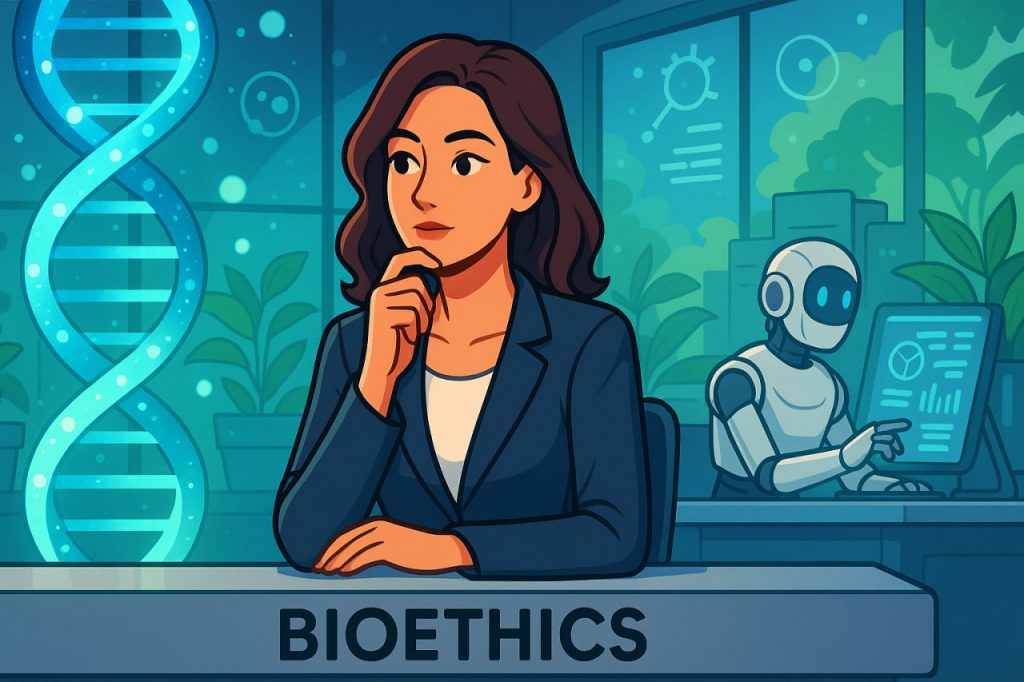Bioethics is the field that examines the moral, social, and philosophical implications of advances in biology, medicine, and technology. As science pushes the boundaries of what is possible—from genetic engineering and cloning to artificial intelligence in healthcare—bioethics helps society determine what should or should not be done. It asks fundamental questions about human dignity, justice, and responsibility. In a world where science evolves faster than law or culture, bioethics serves as a vital bridge between innovation and humanity’s core values.
The Origins and Scope of Bioethics
The term “bioethics” emerged in the 1970s, born from growing public concern about medical experimentation and human rights. It was first used by American biochemist Van Rensselaer Potter, who described bioethics as a “bridge to the future,” connecting biological knowledge with moral wisdom. Since then, the field has expanded to include medical research ethics, environmental protection, reproductive rights, and biotechnology. Its scope continues to evolve, addressing new dilemmas such as genetic modification, artificial intelligence, and organ transplantation.
Core Principles of Bioethics
Bioethics rests on four foundational principles that guide decision-making in science and healthcare:
- Autonomy – Respecting individuals’ rights to make informed choices about their own bodies and treatment.
- Beneficence – Promoting well-being and acting in the best interest of patients or society.
- Nonmaleficence – Avoiding harm; the principle behind the phrase “do no harm.”
- Justice – Ensuring fairness and equality in access to healthcare and research benefits.
These principles help professionals navigate complex ethical conflicts, such as balancing patient autonomy against public safety or allocating limited medical resources during crises.
Bioethics in Medicine and Research
In modern medicine, bioethics is crucial for protecting patients’ rights and maintaining trust. Ethical committees oversee clinical trials to ensure voluntary consent, safety, and transparency. Landmark cases such as the Tuskegee Syphilis Study in the United States, where participants were misled and denied treatment, highlighted the necessity of strict ethical standards. Today, informed consent and ethical review boards are required for all human research. Additionally, questions surrounding end-of-life care, organ donation, and reproductive technologies continue to challenge both doctors and ethicists.
Genetic Engineering and Bioethical Challenges
The development of genetic editing tools like CRISPR-Cas9 has transformed biology but also raised profound ethical questions. Should humans be allowed to alter their genes or those of future generations? Geneticists such as Jennifer Doudna and Feng Zhang emphasize that while gene editing could eliminate hereditary diseases, it could also lead to misuse—creating “designer babies” or genetic inequality. Experts in bioethics argue for global guidelines to ensure responsible use of such technologies, balancing innovation with respect for human rights and diversity.
Artificial Intelligence and the Future of Ethics
Artificial intelligence (AI) introduces new ethical frontiers in medicine and research. Algorithms now assist in diagnosis, drug development, and even robotic surgery. However, AI systems can inherit bias from their data, leading to unfair or inaccurate outcomes. Bioethicists like Dr. Ruha Benjamin and Nick Bostrom warn that transparency, accountability, and human oversight are essential. Ethical AI development must prioritize patient privacy, equity, and human dignity, ensuring that technology enhances—not replaces—the compassion central to healthcare.
Environmental and Global Perspectives
Bioethics extends beyond human health to include the well-being of ecosystems and future generations. Issues such as climate change, biodiversity loss, and sustainable agriculture are increasingly viewed through an ethical lens. The eco-bioethics movement emphasizes that human survival depends on environmental balance. Leading environmental bioethicists argue that science must align with ecological responsibility, advocating for green technologies and ethical food production that respect both nature and human life.
The Importance of Ethical Education
As scientific breakthroughs accelerate, education in bioethics becomes increasingly vital. Universities and medical schools now include ethics as a core discipline to train future researchers and practitioners in moral reasoning. Ethical literacy helps prevent misuse of technology and encourages dialogue among scientists, policymakers, and the public. Informed citizens play a key role in shaping responsible innovation by understanding not only what science can do but also what it should do.
Interesting Facts
- The word “bioethics” combines the Greek words bios (life) and ethos (moral character).
- The Nuremberg Code (1947) was one of the first international ethical standards for human experimentation.
- Bioethics gained global attention after controversies surrounding cloning, euthanasia, and organ markets.
- Many hospitals now have bioethics committees to resolve moral disputes between patients, families, and doctors.
- In 2018, a scientist in China claimed to have created the first gene-edited babies, sparking worldwide ethical outrage.
Glossary
- Autonomy – The right of individuals to make decisions about their own lives and bodies.
- Beneficence – The ethical principle of promoting good and well-being.
- Nonmaleficence – The duty to avoid causing harm.
- Justice – Fairness in the distribution of medical benefits and risks.
- CRISPR-Cas9 – A revolutionary gene-editing technology that allows precise modification of DNA.
- Informed Consent – A process ensuring that participants fully understand and voluntarily agree to medical procedures or research.
- Eco-bioethics – The branch of bioethics that addresses environmental and ecological moral issues.
- Ethical Review Board – A committee that evaluates research proposals to ensure ethical standards are met.
- Designer Babies – Genetically modified embryos with selected traits, raising ethical concerns about inequality and identity.
- AI Ethics – The study of moral principles guiding the development and use of artificial intelligence.


